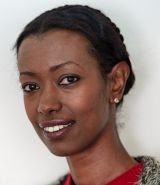
Dear friends,
When I was a kid, I was crazy about numbers. I used to love practicing math with my Dad, who taught me how to solve problems using different methods he had learned in Ethiopia. Although I got the answers right on tests at school, my teacher didn’t give me the same marks as the other students. Instead, she made me sit next to her at her desk and take the tests again. She explained that I must solve the exercises using the method she taught us. After that, I never used my Dad’s methods again.
When they divided us into tracks, I wasn’t put in the highest track, even though I was excellent at math. The teacher told me that I had no chance of moving up to highest track and that this had been done for my own good, in order to give me an experience of success. That was the moment that I realized that math had never been neutral. Math as a discipline and the way it is taught, are actually a reflection of power relations and of the values and stories of the dominant ideology. Success in math at the school I attended was reserved for certain people – and I wasn’t one of them.
Later, when I began to work in education, I discovered that my feelings were supported by research. Studies have shown that ethnicity and gender influence the way teachers perceive their students’ abilities in math. These biases influence their behavior and expectations toward students from different groups, creating large achievement gaps.
I also started to see who is present and who is left out. Math textbooks in Israel are full of white, Jewish families who live in nice houses with a garden. They have money and they spend much of their day buying candy, furniture, and writing utensils. I discovered that the math our children learn is based on European culture, while ignoring the developments and achievements of other cultures. Did you know, for example, that Pythagoras’s theorem was solved much earlier than we assume – in Egypt, Babylon, India, and China? Did you know that the science we all know as algebra was developed by a Muslim Arab mathematician, and that the term “algebra” comes from the Arabic al-jabar, meaning the combination of broken pieces?
At ACRI, we believe that it is both possible and essential to teach differently. Just as teaching math can maintain power relations and prejudices, so too can it become a tool for combating these tendencies. The same is true of other school subjects. In our book Lesson for Life (Hebrew) we explain just how to do this. We offer practical tools for leading a profound process of education against racism while teaching various subjects. Every teacher, lecturer, and parent can be part of this process.
Best wishes,
Mesi Aychek
Coordinator, Education Against Racism
Education Department, ACRI







